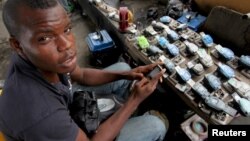ABUJA —
Government electricity has never extended to most of Nigeria's countryside but mobile phones are everywhere. To meet the demand for electricity to keep those phones going, some enterprising villagers have opened "charge shops" where customers can power their phones and help lift the shop owner out of poverty.
There are only a few hundred people in the village of Kakora, which is deep in the forest in northern Nigeria, and most are subsistence farmers, growing maize, cassava and yams to survive.
Kakora homes are made of mud and straw, and none of them have electricity. But just about every one of them has at least one cell phone.
As he left a morning church service, Edward Sunday said it would be a mistake to assume that Kakora residents didn’t need those phones, not to mention Facebook and Twitter.
“Especially the young ones that are coming up. We are educated now. We are connected to more things now,” he said.
Sunday said his father had a generator that can charge his phone, but they didn’t always have enough fuel to operate it. In a pinch, he said, for less than the cost of fuel, he could also bring his phone to one of the shops popping up all over the countryside.
For 5 to 10 cents, he said, you could charge your phone at the shop on a single small generator.
“You will see more than 10 phones there because everybody is trying to charge his phone so he can connect to his people,” said Sunday.
In the town square, another man, Kojeyat, put his phone in his pocket, saying he's out of power and out of cash. He asked a passerby if he could borrow 20 Nigerian naira -- about 10 cents -- for a charge.
Kojeyat said that a few kilometers from the village there was an area with electricity where he could charge for free. But he said, the remote roads in this region, which is plagued by sectarian violence and insurgency, were dangerous, especially at night.
“Due to that problem you couldn’t charge the phone because of the risks along the road and everything like that. So we face a lot of challenges in the village,” said Kojeyat.
On a hilltop outside of town -- where people went to use their charged phones because of poor reception in the village -- a shop owner said he often charged 50 phones a night, making a small profit in a place where there were almost no other business opportunities.
Despite the poverty, Kojeyat said life in Kakora wa quiet and happy. But he may have to move out because he’s not a farmer and didn't have a generator shop. To start another kind business, he said, he needed enough electricity to keep his phone on.
(Ibrahim Yakubu contributed to this report from Kaduna state.)
There are only a few hundred people in the village of Kakora, which is deep in the forest in northern Nigeria, and most are subsistence farmers, growing maize, cassava and yams to survive.
Kakora homes are made of mud and straw, and none of them have electricity. But just about every one of them has at least one cell phone.
As he left a morning church service, Edward Sunday said it would be a mistake to assume that Kakora residents didn’t need those phones, not to mention Facebook and Twitter.
“Especially the young ones that are coming up. We are educated now. We are connected to more things now,” he said.
Sunday said his father had a generator that can charge his phone, but they didn’t always have enough fuel to operate it. In a pinch, he said, for less than the cost of fuel, he could also bring his phone to one of the shops popping up all over the countryside.
For 5 to 10 cents, he said, you could charge your phone at the shop on a single small generator.
“You will see more than 10 phones there because everybody is trying to charge his phone so he can connect to his people,” said Sunday.
In the town square, another man, Kojeyat, put his phone in his pocket, saying he's out of power and out of cash. He asked a passerby if he could borrow 20 Nigerian naira -- about 10 cents -- for a charge.
Kojeyat said that a few kilometers from the village there was an area with electricity where he could charge for free. But he said, the remote roads in this region, which is plagued by sectarian violence and insurgency, were dangerous, especially at night.
“Due to that problem you couldn’t charge the phone because of the risks along the road and everything like that. So we face a lot of challenges in the village,” said Kojeyat.
On a hilltop outside of town -- where people went to use their charged phones because of poor reception in the village -- a shop owner said he often charged 50 phones a night, making a small profit in a place where there were almost no other business opportunities.
Despite the poverty, Kojeyat said life in Kakora wa quiet and happy. But he may have to move out because he’s not a farmer and didn't have a generator shop. To start another kind business, he said, he needed enough electricity to keep his phone on.
(Ibrahim Yakubu contributed to this report from Kaduna state.)





